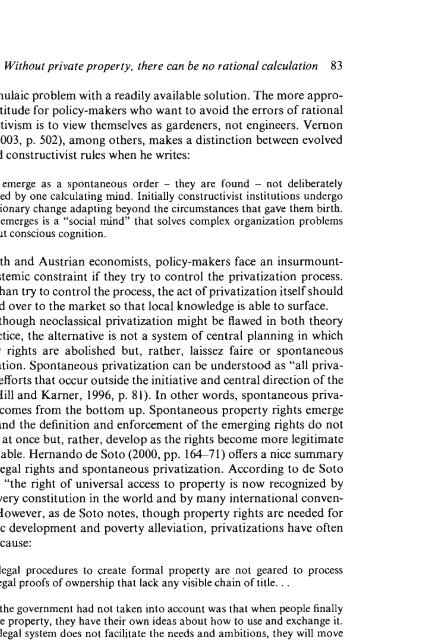Handbook on Contemporary Austrian Economics
Handbook on Contemporary Austrian Economics
Handbook on Contemporary Austrian Economics
You also want an ePaper? Increase the reach of your titles
YUMPU automatically turns print PDFs into web optimized ePapers that Google loves.
Without private property, there can be no rati<strong>on</strong>al calculati<strong>on</strong> 83<br />
to a formulaic problem with a readily available soluti<strong>on</strong>. The more appropriate<br />
attitude for policy-makers who want to avoid the errors of rati<strong>on</strong>al<br />
c<strong>on</strong>structivism is to view themselves as gardeners, not engineers. Vern<strong>on</strong><br />
Smith (2003, p. 502), am<strong>on</strong>g others, makes a distincti<strong>on</strong> between evolved<br />
rules and c<strong>on</strong>structivist rules when he writes:<br />
Rules emerge as a sp<strong>on</strong>taneous order - they are found - not deliberately<br />
designed by <strong>on</strong>e calculating mind. Initially c<strong>on</strong>structivist instituti<strong>on</strong>s undergo<br />
evoluti<strong>on</strong>ary change adapting bey<strong>on</strong>d the circumstances that gave them birth.<br />
What emerges is a "social mind" that solves complex organizati<strong>on</strong> problems<br />
without c<strong>on</strong>scious cogniti<strong>on</strong>.<br />
For Smith and <strong>Austrian</strong> ec<strong>on</strong>omists, policy-makers face an insurmountable<br />
epistemic c<strong>on</strong>straint if they try to c<strong>on</strong>trol the privatizati<strong>on</strong> process.<br />
Rather than try to c<strong>on</strong>trol the process, the act of privatizati<strong>on</strong> itself should<br />
be turned over to the market so that local knowledge is able to surface.<br />
Even though neoclassical privatizati<strong>on</strong> might be flawed in both theory<br />
and practice, the alternative is not a system of central planning in which<br />
property rights are abolished but, rather, laissez faire or sp<strong>on</strong>taneous<br />
privatizati<strong>on</strong>. Sp<strong>on</strong>taneous privatizati<strong>on</strong> can be understood as "all privatizati<strong>on</strong><br />
efforts that occur outside the initiative and central directi<strong>on</strong> of the<br />
state" (Hill and Karner, 1996, p. 81). In other words, sp<strong>on</strong>taneous privatizati<strong>on</strong><br />
comes from the bottom up. Sp<strong>on</strong>taneous property rights emerge<br />
slowly, and the definiti<strong>on</strong> and enforcement of the emerging rights do not<br />
come all at <strong>on</strong>ce but, rather, develop as the rights become more legitimate<br />
and valuable. Hernando de Soto (2000, pp. 164-71) offers a nice summary<br />
of extralegal rights and sp<strong>on</strong>taneous privatizati<strong>on</strong>. According to de Soto<br />
(p. 165), "the right of universal access to property is now recognized by<br />
nearly every c<strong>on</strong>stituti<strong>on</strong> in the world and by many internati<strong>on</strong>al c<strong>on</strong>venti<strong>on</strong>s."<br />
However, as de So to notes, though property rights are needed for<br />
ec<strong>on</strong>omic development and poverty alleviati<strong>on</strong>, privatizati<strong>on</strong>s have often<br />
failed because:<br />
most legal procedures to create formal property are not geared to process<br />
extralegal proofs of ownership that lack any visible chain of title . . .<br />
What the government had not taken into account was that when people finally<br />
acquire property, they have their own ideas about how to use and exchange it.<br />
If the legal system does not facilitate the needs and ambiti<strong>on</strong>s, they will move<br />
out of the system in droves. (Ibid., pp. 166-7)<br />
According to some legal scholars, such as Holmes and Sunstein (1999), the<br />
extralegal rights we are discussing are meaningless because property rights<br />
cannot exist without the state. However, though legal scholars may dispute

















